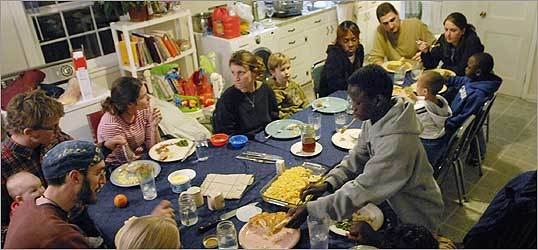From the Boston Globe today:
The unexpected monks
Some evangelicals turn to monasticism, suggesting unease with megachurch religion - and the stirrings of rapprochement with the Roman Catholic Church.
 Members of the Rutba House in Durham, N.C., gather for meals and morning and evening prayer. (Globe / Davis Turner)
Members of the Rutba House in Durham, N.C., gather for meals and morning and evening prayer. (Globe / Davis Turner)S.G. PRESTON IS a Knight of Prayer. Each morning at his Vancouver, Wash., home, he wakes up and prays one of the 50-odd psalms he has committed to memory, sometimes donning a Kelly green monk's habit. In Durham, N.C., Jonathan Wilson-Hartgrove and fellow members of Rutba House gather for common meals as well as morning and evening prayer based on the Benedictine divine office. Zach Roberts, founder of the Dogwood Abbey in Winston-Salem, meets regularly with a Trappist monk to talk about how to contemplate God. Roman Catholic monastic traditions loom large in their daily routines - yet all three men are evangelical Protestants.
The image of the Catholic monk - devoted to a cloistered life of fasting and prayer, his tonsured scalp hidden by a woolen cowl - has long provoked the disdain of Protestants. Their theological forefathers denounced the monastic life: True Christians, the 16th-century Reformers said, lived wholly in the world, spent their time reading the Bible rather than chanting in Latin, and accepted that God saved them by his grace alone, not as reward for prayers, fasting, or good works. Martin Luther called monks and wandering friars "lice placed by the devil on God Almighty's fur coat." Of all Protestants, American evangelicals in particular - activist, family-oriented, and far more concerned with evangelism than solitary study or meditative prayer - have historically viewed monks as an alien species, and a vaguely demonic one at that.
Yet some evangelicals are starting to wonder if Luther's judgment was too hasty. There is now a growing movement to revive evangelicalism by reclaiming parts of Roman Catholic tradition - including monasticism. Some 100 groups that describe themselves as both evangelical and monastic have sprung up in North America, according to Rutba House's Wilson-Hartgrove. Many have appeared within the past five years. Increasing numbers of evangelical congregations have struck up friendships with Catholic monasteries, sending church members to join the monks for spiritual retreats. St. John's Abbey, a Benedictine monastery in Minnesota, now makes a point of including interested evangelicals in its summer Monastic Institute.
"I grew up in a tradition that believes Catholics are pagans," said Roberts, who was raised Southern Baptist and serves as a pastor in a Baptist church. "I never really understood that. Now I'd argue against that wholeheartedly."
In an era in which televangelists and megachurches dominate the face of American evangelicalism, offering a version of Christianity inflected by populist aesthetics and the gospel of prosperity, the rise of the New Monastics suggests that mainstream worship is leaving some people cold. Already, they are transforming evangelical religious life in surprising ways. They are post-Protestants, breaking old liturgical and theological taboos by borrowing liberally from Catholic traditions of monastic prayer...1.This is a long article, four pages, but worth reading for those following this trend. Click HERE to read the rest of the article.
Evangelicals have been tentatively exploring that side of Christian tradition since at least the 1978 publication of "Celebration of Discipline" by Richard Foster, a Quaker theologian who recast fasting and meditative prayer for an evangelical audience. His book sold nearly 2.5 million copies and launched a cottage industry of evangelical contemplative literature - a phrase that, 30 years ago, was a contradiction in terms. Some evangelicals made pilgrimages to the handful of older ecumenical monastic communities abroad, such as the Taizé Community (founded in Burgundy, France, in 1940), and the Iona Community, founded in 1938 at St. Columba's landing place in the Inner Hebrides. They brought back what they learned, and have tried to make it their own. 2.
*********************************
The influence of Richard Foster and his works is nothing new, but what is noteworthy is the direction Foster's spiritual disciplines takes its followers ~ straight into the arms of the Roman Catholic church.
We need to be in prayer for our family and friends. The issue of the "new monasticism" is not going to go away. It must be dealt with head on, and those within our sphere of influence be warned about the roots of this movement. God bless each of you out there who is working diligently to do this.
about our common salvation,
I felt the necessity to write to you
appealing that you contend earnestly for the faith
which was once for all handed down to the saints.
For certain persons have crept in unnoticed,
those who were long beforehand marked out for this condemnation,
ungodly persons who turn the grace of our God into licentiousness
and deny our only Master and Lord, Jesus Christ.
1. http://www.boston.com/bostonglobe/ideas/articles/2008/02/03/the_unexpected_monks/
2. http://www.boston.com/bostonglobe/ideas/articles/2008/02/03/the_unexpected_monks/?page=4












No comments:
Post a Comment